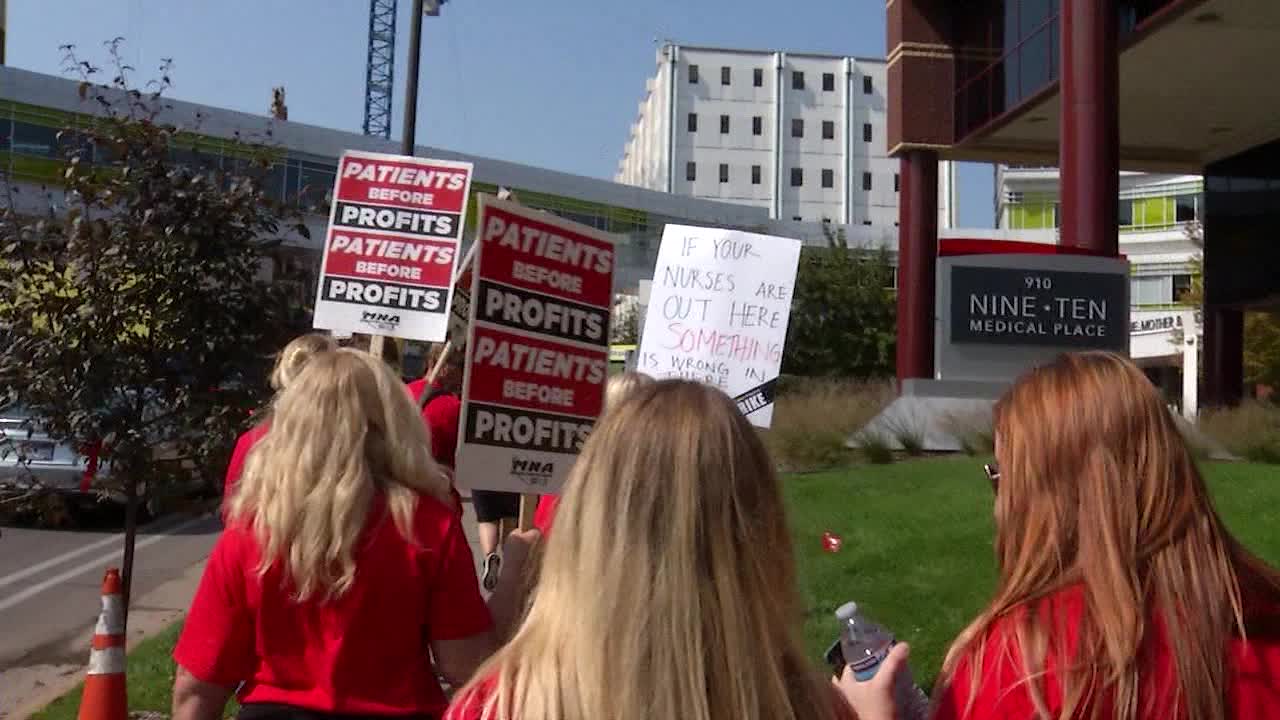The role of top officials in negotiating labor disputes at state, federal level
Pressure mounted as the days passed without deal between major rail companies and union workers. President Biden’s administration hosted talks on Wednesday in an attempt to advance negotiations.
Senate Republicans, meanwhile, proposed a measure to force the unions to accept a contract. It was blocked by Democrats.
By Thursday, a tentative deal was reached. President Biden touted his administration’s role in negotiating the pending agreement to keep the railroads running.
“They’ll be able to continue to operate effectively as a vital piece of our economy,” said President Biden.
The intervention by top officials in labor negotiations is familiar to Minnesotans.

Nurses held a three day strike earlier this week, but negotiations continue (KSTP).
During a 37-day strike in 2016, former Governor Mark Dayton brought Allina Health and the Minnesota Nurses Association together at the Governor’s residence with a federal mediator. An agreement was reached after a 17-hour negotiating session, according to MNA.
“Often governors, presidents, commissioners get involved in a strike when it has a really serious impact not just on the two parties that are trying to negotiate the collective bargaining agreement but all of society,” said Joseph Daly, a Mitchell Hamline School of Law professor and labor arbitrator.
Daly explained there are multiple ways top officials can become involved in negotiations in Minnesota, including if both sides agree to bringing in the state’s Bureau of Mediation Services.
“That mediator can ask anybody that he or she wants to help in the mediation, including the government so the governor could come in at the invitation of the mediator,” said Daly. “The governor could also come in at the invitation of the parties to help with that strike.”
He added, “It’s easy for governor of the State of Minnesota to pick up the phone. […] The governor may never show up in a room to be the official mediator but the governor is talking at night to the president of the union saying ‘Look, this is way too important you gotta give a little, you gotta bend a little’ and then make another phone call to the hospital folks negotiators and push the same way.”
It’s unclear whether any of these conversations are happening during the current dispute between the nurses’ union and seven healthcare providers.
5 EYEWITNESS NEWS reached out to Gov. Walz office to see if he’s speaking with the parties involved, or if he plans to assist with future negotiations if the sides can’t reach an agreement. We did not receive a response.
“I wouldn’t be surprised if high level officials, if they can’t get this resolved, they’ll start pushing their way in or be invited in,” said Daly.
On Tuesday, Gov. Walz visited the picket line during their three day strike. He told the crowd, “We stand with you in solidarity to protect our patients, we stand with you in your right to collectively bargain and most importantly we stand here to say thank you nurses for protecting Minnesotans.”
“Politicians of course are weighing a couple of things,” said April Eichmeier, an assistant professor of strategic communications at the University of St. Thomas. “I think a lot of politicians, elected officials want to do good but they’re also keenly aware of elections so the key from a strategic standpoint is to associate themselves with the issues and with the stances that their voters will approve of.”
She added, “You see this on both sides of the isle.”
It’s a strategy used at both the state and federal level.
“Thinking about Biden getting directly involved, his voters care about workers issues and so he is signaling to a sense that he cares about this issue,” said Eichmeier.
Negotiations between MNA and healthcare providers are expected to resume next week.
Republican gubernatorial candidate Dr. Scott Jensen said in a statement, “Nurses went from being treated like heroes during the pandemic to being treated like zeroes today. As a practicing physician, I understand firsthand the critical role nurses play in caring for a patient. While I’m confident both sides would like an agreement reached long before the election, I’m also confident they would prefer government stay out of their negotiations and allow them to collectively bargain. That’s their right and I don’t think government should interfere unless asked by both sides.”